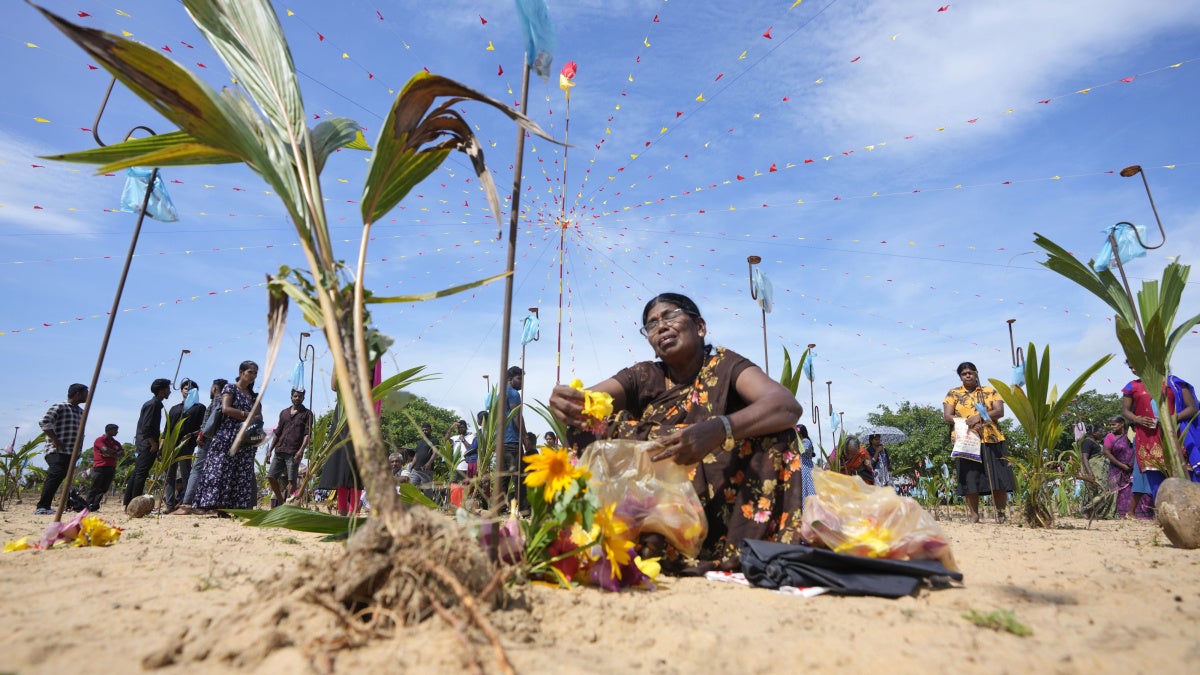Domestic abuse: UK first as QUB student nurses to be trained in spotting signs – BBC

Report on the “Unlock Safety Initiative” for Nursing Students in Northern Ireland
A Strategic Advancement Towards Sustainable Development Goals
A pioneering training program, the “Unlock Safety Initiative,” has been launched at Queen’s University Belfast (QUB) to equip nursing students with the skills to identify and respond to domestic abuse. This report details the initiative’s structure, objectives, and its significant alignment with the United Nations Sustainable Development Goals (SDGs), particularly SDG 3 (Good Health and Well-being), SDG 4 (Quality Education), SDG 5 (Gender Equality), and SDG 16 (Peace, Justice and Strong Institutions).
Program Overview and Objectives
Core Mission and Scope
The “Unlock Safety Initiative” is the first of its kind in the UK, designed to be integrated into the nursing degree programme at QUB. It aims to train approximately 600 prospective nurses annually.
- Objective 1: To develop skills in recognising the signs of domestic abuse, including non-visible indicators.
- Objective 2: To equip students to respond appropriately and sensitively to disclosures from patients.
- Objective 3: To enable future nurses to connect victims with specialised support services, facilitating early intervention.
Upon completion, nurses will receive a badge, signifying to patients that they are a trained and safe point of contact.
Direct Contribution to Sustainable Development Goals
The initiative’s framework is intrinsically linked to achieving global sustainability targets.
- SDG 3 (Good Health and Well-being): By treating domestic abuse as a critical public health issue, the program prepares healthcare professionals to protect the physical and mental well-being of vulnerable individuals, directly contributing to Target 3.4 (promote mental health and well-being).
- SDG 5 (Gender Equality): The program is a targeted intervention to combat violence against women and girls (Target 5.2), a pervasive issue of gender inequality. It empowers the nursing workforce, of which nearly 90% are women, to address this challenge.
- SDG 16 (Peace, Justice and Strong Institutions): By strengthening the primary healthcare response to violence, the initiative helps build more peaceful and inclusive societies (Target 16.1: significantly reduce all forms of violence).
Context and Rationale
Statistical Imperative for Action
The urgency of this program is underscored by recent statistics from Northern Ireland, which highlight domestic abuse as a significant challenge to public safety and well-being.
- Police recorded nearly 30,000 domestic abuse incidents between June 2024 and 2025, accounting for approximately 20% of all reported crime.
- In the past year, Women’s Aid NI supported over 7,600 women and 5,200 children affected by domestic abuse.
- Pregnancy was identified as a trigger, with the charity supporting 266 pregnant women during the same period.
A Multi-Stakeholder Partnership for the Goals (SDG 17)
The initiative exemplifies the collaborative approach advocated by SDG 17 (Partnerships for the Goals). Its development was a joint effort between key institutions from academia, civil society, professional bodies, and government.
- Queen’s University Belfast (QUB)
- Women’s Aid Federation Northern Ireland
- The Royal College of Nursing (RCN)
- The Executive Office’s Change Fund
Implementation and Expected Outcomes
Integration into Quality Education (SDG 4)
The permanent integration of this training into the nursing curriculum ensures its sustainability and impact. This enhancement of professional education aligns with SDG 4 (Quality Education) by providing learners with knowledge and skills needed to promote sustainable development and human rights (Target 4.7).
Anticipated Long-Term Impacts
The “Unlock Safety Initiative” is expected to yield profound and lasting benefits for society.
- Enhanced Early Intervention: Equipping nurses to identify abuse early can help break cycles of violence, improving long-term health outcomes (SDG 3).
- Improved Patient Care: The training will improve nurse-patient communication and ensure that care is better informed, especially for individuals with communication difficulties, such as those with learning disabilities.
- A More Resilient Healthcare System: The program contributes to a healthcare workforce that is better prepared to address complex social determinants of health, strengthening institutional capacity (SDG 16).
- Life-Saving Potential: As articulated by student participants, the skills acquired through this training have the potential to save lives by providing a crucial first line of support for victims.
1. SDGs Addressed in the Article
SDG 3: Good Health and Well-being
- The article discusses training for healthcare professionals (nurses) to identify and respond to domestic abuse. This directly relates to ensuring healthy lives and promoting well-being, as domestic abuse has severe physical and mental health consequences. The initiative aims to improve the healthcare response to a significant public health issue.
SDG 4: Quality Education
- The core of the article is about a new training program being integrated into the nursing degree at Queen’s University Belfast (QUB). This initiative focuses on providing quality education and specialized skills to “equip 600 prospective nurses a year,” enhancing their professional capabilities and knowledge on a critical social issue.
SDG 5: Gender Equality
- This is the most prominent SDG addressed. The article focuses on domestic abuse and is explicitly framed as a way of “tackling violence against women and girls in Northern Ireland.” It cites statistics on domestic abuse incidents and the support provided to women and children by Women’s Aid, directly highlighting the goal of eliminating violence against women.
SDG 17: Partnerships for the Goals
- The article highlights a multi-stakeholder partnership to achieve the initiative’s goals. It states, “The initiative was developed between QUB and the Women’s Aid Federation Northern Ireland, the Royal College of Nursing (RCN) and the Executive Office’s Change Fund,” demonstrating a collaborative effort between academia, civil society, a professional body, and government.
2. Specific Targets Identified
Target 5.2: Eliminate all forms of violence against all women and girls in the public and private spheres.
- The “Unlock Safety Initiative” is designed to equip nurses to “spot signs of domestic abuse” and respond effectively. This is a direct measure aimed at early intervention and support for victims, contributing to the elimination of violence. The article’s focus on “tackling violence against women and girls” aligns perfectly with this target.
Target 4.7: By 2030, ensure that all learners acquire the knowledge and skills needed to promote sustainable development, including, among others, through education for… human rights, gender equality, promotion of a culture of peace and non-violence…
- The training program provides nursing students with the specific “knowledge and skills” to address domestic violence. Student nurse Kellie-Ann Winchester notes the training will enable nurses to be “better equipped to speak about domestic violence” and promote “early intervention… breaking the cycle,” which directly supports the promotion of non-violence and gender equality through education.
Target 3.d: Strengthen the capacity of all countries… for early warning, risk reduction and management of national and global health risks.
- Domestic abuse is a significant national health risk. By training 600 nurses annually to “recognise the signs,” the program strengthens the capacity of the healthcare system to provide early warning and risk reduction for individuals affected by abuse. Johanna McMullan, from QUB, states that students will “inevitably have to utilise these skills,” highlighting the program’s role in managing this health risk.
Target 17.17: Encourage and promote effective public, public-private and civil society partnerships, building on the experience and resourcing strategies of partnerships.
- The article explicitly names the partners involved: Queen’s University Belfast (academia), Women’s Aid Federation Northern Ireland (civil society), the Royal College of Nursing (professional body/civil society), and the Executive Office’s Change Fund (public/government). This collaboration is a clear example of the multi-stakeholder partnership model promoted by this target.
3. Indicators Mentioned or Implied
Indicators for Target 5.2
- Prevalence of domestic abuse: The article states that police “recorded almost 30,000 domestic abuse incidents in Northern Ireland between June 2024 and 2025.” This figure serves as a direct indicator of the scale of violence.
- Number of victims seeking support: The article mentions that in the past year, Women’s Aid has “supported more than 7,600 women, as well as 5,200 children,” and “supported 266 women who were pregnant.” These numbers can be used to measure the demand for support services and the reach of organizations working to help victims.
Indicators for Target 4.7
- Number of students trained: The initiative aims to “equip 600 prospective nurses a year.” This is a quantifiable indicator of the number of learners acquiring skills related to promoting non-violence and gender equality.
Indicators for Target 3.d
- Number of healthcare workers with specialized skills: The training of “600 prospective nurses a year” is an indicator of the strengthened capacity of the healthcare workforce to identify and manage the health risks associated with domestic abuse.
4. Table of SDGs, Targets, and Indicators
| SDGs | Targets | Indicators |
|---|---|---|
| SDG 5: Gender Equality | Target 5.2: Eliminate all forms of violence against all women and girls. |
|
| SDG 4: Quality Education | Target 4.7: Ensure all learners acquire knowledge and skills to promote gender equality and non-violence. |
|
| SDG 3: Good Health and Well-being | Target 3.d: Strengthen capacity for early warning and management of national health risks. |
|
| SDG 17: Partnerships for the Goals | Target 17.17: Encourage and promote effective public, public-private and civil society partnerships. |
|
Source: bbc.com
What is Your Reaction?
 Like
0
Like
0
 Dislike
0
Dislike
0
 Love
0
Love
0
 Funny
0
Funny
0
 Angry
0
Angry
0
 Sad
0
Sad
0
 Wow
0
Wow
0














































































